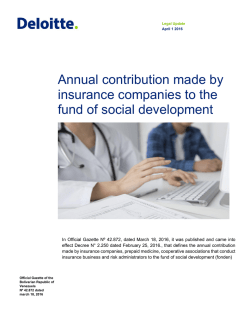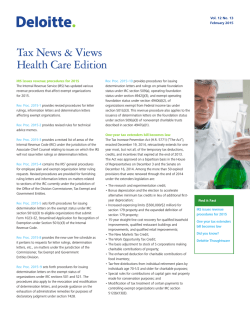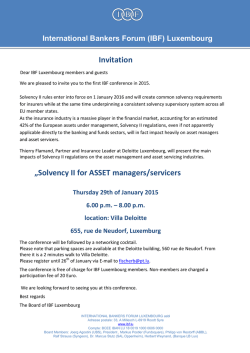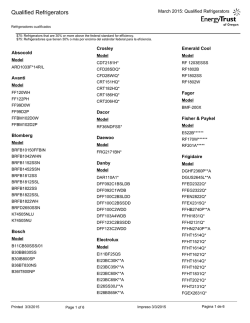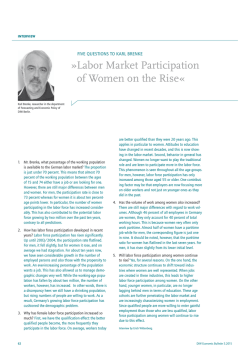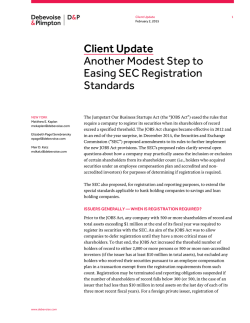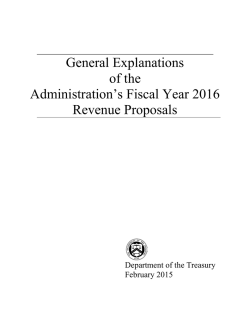
Download the report
Investment management tax alert January 30, 2015 Recent developments in the qualified small business stock rules The Tax Increase Prevention Act (“TIPA”) of 2014, enacted on December 19, 2014, retroactively extends several tax incentives that expired at the end of 2013. And while the reprieve may be short-lived, through the end of 20141, these extensions may provide valuable planning opportunities for taxpayers. Further, a recently issued private letter ruling [“PLR”] provides some helpful guidance on what may be considered a qualified small business (“QSB”). Taxpayers should consider these developments, including the potential for these preferential rules to be extended once again. Dispositions in 2014 should be considered for the application of these rules. The importance of the qualified small business stock exclusion Among the key features of TIPA is a provision extending benefits to eligible investors in qualified small businesses. Originally enacted in 1993, section 12022 was intended to encourage investment in small businesses by providing a 50 percent exclusion of gain resulting from the sale of a qualified small business stock (“QSBS”) held for more than five years. To qualify as QSBS, stock must be (i) issued by a “qualified small business” after August 10, 1993; and (ii) acquired by the taxpayer at original issuance in exchange for money, property (other than stock), or services (or acquired in certain nonrecognition transactions). The benefit of this provision has changed over the years for a variety of reasons as discussed below. However, today, the benefit of this provision is the difference between the maximum capital gains tax rate applied to the disposition of non-QSBS stock and the maximum QSBS gains tax rate (i.e., 0 percent), which is 23.8 percent. Over the years, primarily as the maximum capital gains tax rate fell, the exclusion offered by section 1202 lost its appeal due both to the exclusion’s own inherent limitations as well as the effect of the alternative minimum tax (“AMT”) imposed on many eligible investors in QSBS. Indeed, the Jobs Growth Tax Relief Reconciliation Act of 2003 effectively eliminated any tax rate benefit afforded by the section 1202 exclusion, as the maximum capital gains tax rate was 15 percent while the maximum QSBS gain tax rate for many taxpayers was 14.98 percent (as the QSBS gain excluded by section 1202 was a preference item that is added back to a taxpayer’s income in computing his or her AMT income). In 2010, section 1202 was amended to provide a temporary 100 percent gain exclusion for QSBS acquired after September 27, 2010. Through subsequent legislation, including the recently enacted TIPA of 2014, the exclusion has been extended for QSBS acquired through December 31, 2014. However, the 2010 amendments did more than just raise the exclusion to 100 percent; they also eliminated the excluded section 1202 gain as a preference item, meaning that the excluded gain is no longer subject to the AMT. Beginning in 2013, the maximum capital gains rate has been increased to 20 percent and the new net investment income tax [“NII”] tax of 3.8 percent, is now applied to most investment income, including gains from the sale of stock. However, gain that is exempt from tax under section 1202 would also be exempt from the 3.8 percent NII tax. As such, the recent increases to the exclusion amount under section 1202, coupled with the significant increase in tax rates on investment income, have combined to make the section 1202 exclusion once again an attractive tax 1 This provision was included with the list of Extenders in 2014. It is possible that this provision can be included as part of the Extenders package in the future. 2 Unless otherwise indicated, all “section” references are to the Internal Revenue Code of 1986, as amended (the “Code”), and all “Treas. Reg. §” references are to the Treasury regulations promulgated under the Code, all as in effect on the date of this memorandum. incentive for investors in qualified small businesses. As noted above, the difference between the maximum capital gains tax rate applied to the disposition of non-QSBS stock and the maximum QSBS gains tax rate (i.e., 0 percent) now stands at 23.8 percent. What is a qualified small business? A taxpayer can only avail itself of the benefits of the section 1202 exclusion if the QSBS is issued by a QSB. Many of the requirements for a QSB are mechanical; however, one of the requirements stands out, having stymied taxpayers over the years due to its lack of direct guidance. Specifically, a corporation can be a QSB only if at least 80 percent of its assets are used in the active conduct of at least one “qualified trade or business”. While the statute itself provides limited guidance as to what constitutes a qualified trade or business, it does so indirectly, by exclusion. That is to say, a qualified trade or business does not include any trade or business involving the performance of services in the fields of health, law, engineering, architecture, accounting, actuarial science, performing arts, athletics, financial services, brokerage services, consulting, or any other trade or business where the principal asset of such trade or business is the reputation or skill of one or more of its employees. Recently, the IRS offered helpful guidance surrounding the definition of QSB. PLR 201436001 takes a deeper dive into the provision of services and those trades or businesses in which a significant asset is the reputation or skill or one or more of its employees. The ruling itself involves a company that provided products and services in the pharmaceutical industry, but the reasoning behind its conclusion should have broader application. In the ruling, the company’s activities included research on: (i) drug formulation and drug effectiveness; (ii) clinical testing; and (iii) manufacturing of drugs. In the execution of its client contracts, the company worked with these clients to help develop successful drug manufacturing processes. In this effort, the company used physical assets including manufacturing and clinical testing facilities, and also used intellectual property it owned. Examining whether the company was engaged in a qualified trade or business, the IRS explains “the thrust of [section] 1202(e)(3) is that businesses are not qualified trades or business if they offer value to customers primarily in the form of services, whether those services are the providing of hotel rooms, for example, or in the form of individual expertise (law firm partners).” Clearly, the company provided services in the form of research, testing, manufacturing, and problem solving for its customers in the pharmaceutical industry. In providing these services, the company relied on its skill and reputation as one of its principal assets. Nonetheless, the IRS appears to have eschewed a broad literal reading of the statutory language in favor of a narrower, pragmatic analysis of the nature of the services being provided. The services were not themselves, the end product, but rather were a means to produce some tangible (or perhaps even intangible) product. In this respect, the company’s use of specific manufacturing and intellectual property assets to create value for its customers meant it was more akin to a manufacturer of parts in the automobile industry. The ruling should be a welcome relief to many start-ups that perhaps had concluded they could not meet the definition of a qualified trade or business because, lacking in hard assets, they rely on the reputation or skill of their people providing services. In particular, where reputations and skills are part of a larger enterprise aimed at developing tangible and intangible assets, taxpayers may find solace in the reasoning of the ruling. These start-ups may now feel more confident requesting a ruling that they too are a QSB. Section 1202 may have fallen out of favor with investors since its enactment in 1993. Yet given the disparity in maximum tax rates between QSBS and non-QSBS, along with favorable guidance as to what the IRS views as a qualified trade or business, it would be a mistake to overlook this important tax incentive. Contacts If you have any questions or would like to discuss potential implications for your investment funds, please contact us. David Benz Principal Deloitte Tax LLP +1 213 996 4986 [email protected] Jim Calzaretta Partner Deloitte Tax LLP +1 312 486 9138 [email protected] For further information, visit our website at www.deloitte.com/us. This alert contains general information only and Deloitte is not, by means of this alert, rendering accounting, business, financial, investment, legal, tax, or other professional advice or services. This alert is not a substitute for such professional advice or services, nor should it be used as a basis for any decision or action that may affect your business. Before making any decision or taking any action that may affect your business, you should consult a qualified professional advisor. Deloitte shall not be responsible for any loss sustained by any person who relies on this alert. About Deloitte Deloitte refers to one or more of Deloitte Touche Tohmatsu Limited, a UK private company limited by guarantee, and its network of member firms, each of which is a legally separate and independent entity. Please see www.deloitte.com/about for a detailed description of the legal structure of Deloitte Touche Tohmatsu Limited and its member firms. Certain services may not be available to attest clients under the rules and regulations of public accounting. Copyright © 2015 Deloitte Development LLC. All rights reserved. Member of Deloitte Touche Tohmatsu Limited
© Copyright 2026
